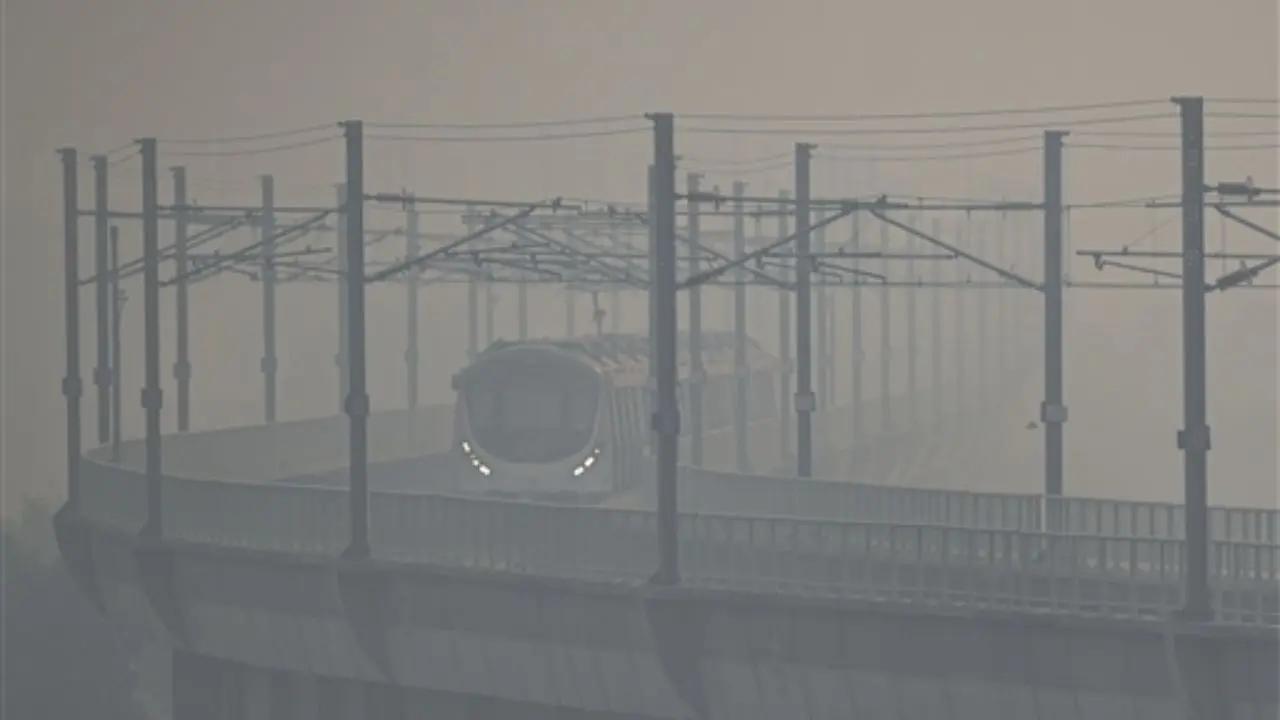The air quality of Delhi remains"very poor" with Air Quality Index (AQI) of around 310, indicating that the city's air quality is concerning. Pollution levels continue to be a major concern

A metro train runs amid low visibility. File pic/PTI
The air quality of Delhi remains"very poor" with Air Quality Index (AQI) of around 310, indicating that the city's air quality is concerning. Pollution levels continues to be a major concern, notwithstanding a brief respite brought about by the removal of restrictions under the Graded Response Action Plan (GRAP) - 4.
ADVERTISEMENT
Reiterating Delhi's 'very bad' air quality classification, the System of Air Quality and Weather Forecasting and Research (SAFAR-India) reported Monday's AQI registered at 310 at 8:30 am.
Data from the Central Pollution Control Board (CPCB) collected at different places showed alarming figures: Anand Vihar at 361, Alipur at 368, Ashok Vihar at 342, ITO at 318, and RK Puram at 344, all of which confirmed the 'very poor' air quality.
Environment Minister Gopal Rai called for continuous vigilance after the GRAP-4 limitations were lifted, stressing the importance of implementing GRAP stages 1, 2, and 3 to address the city's air pollution. Rai emphasised that in order to sustain the gains made in air quality, residents must continue to be conscious of the issue.
Rai warned against complacency while noting a slight improvement in pollution levels over the past two days. He blamed irresponsibility for the post-Diwali surge in the Air Quality Index (AQI) and advised the public to use caution and follow recommended guidelines.
With the exception of BS-3 and BS-4 petrol and diesel cars, the majority of vehicles were able to enter the city and building activities were able to continue following the Commission for Air Quality Management's (CAQM) decision to abolish GRAP-4 restrictions.
However, Gopal Rai made it clear that restrictions under GRAP 1, GRAP 2, and GRAP 3 will not be lifted until additional reductions in pollution are seen. In order to reduce Delhi's pollution levels, limitations on particular car types, building operations, and projects are still in effect.
Rai included projects pertaining to airports, trains, metro, stations, national security protocols, hospitals, sanitation initiatives, and projects of national significance while highlighting the ones that can now carry out construction. On the other hand, some activities on unmetalled roads are still forbidden, such as mining, demolition, and structural construction.
The relaxation of GRAP-4 and the continued application of GRAP-3 standards were both indicated by Rai, who underlined the necessity for clarity between the two sets of constraints.
According to Gopal Rai, the creation of a dedicated 6-person task force is intended to provide careful oversight and efficient execution of GRAP recommendations. The task force will be led by the Environment Special Secretary.
In order to mitigate Delhi's pollution problems, it is necessary to continue the fight against the city's declining air quality and to strictly comply with environmental standards.
 Subscribe today by clicking the link and stay updated with the latest news!" Click here!
Subscribe today by clicking the link and stay updated with the latest news!" Click here!







